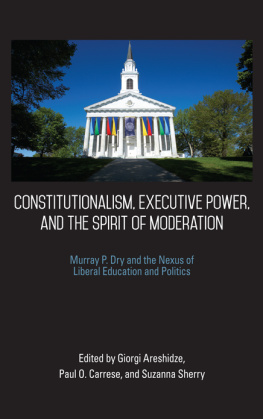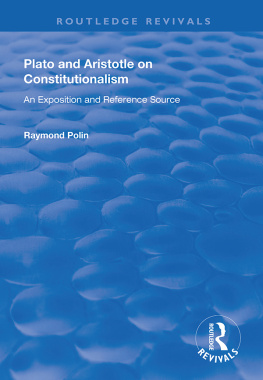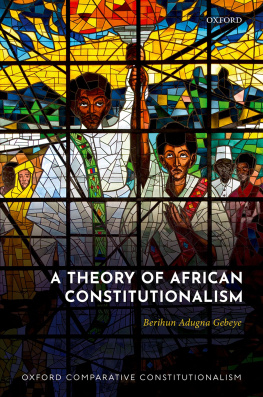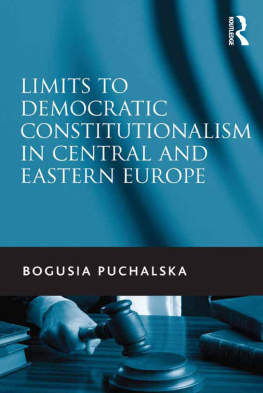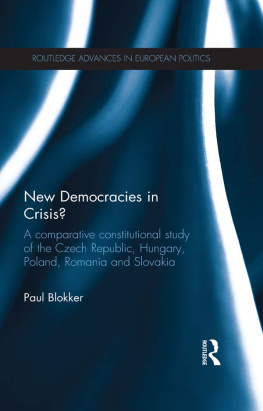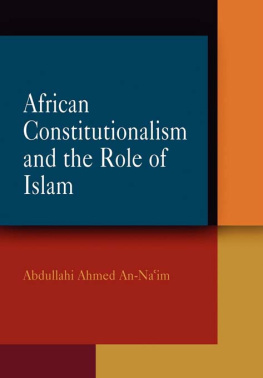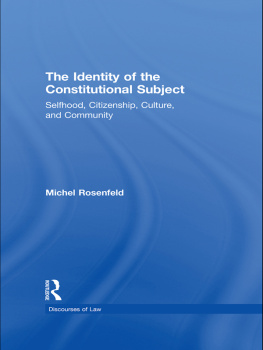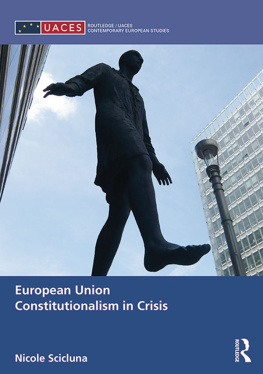Constitutionalism, Executive Power, and the Spirit of Moderation
SUNY series in American Constitutionalism
Robert J. Spitzer, editor
Constitutionalism, Executive Power, and the Spirit of Moderation
Murray P. Dry and the Nexus of Liberal Education and Politics
Edited by
Giorgi Areshidze, Paul O. Carrese, and Suzanna Sherry
Cover image: Mead Chapel at Middlebury College
Published by State University of New York Press, Albany
2016 State University of New York
All rights reserved
Printed in the United States of America
No part of this book may be used or reproduced in any manner whatsoever without written permission. No part of this book may be stored in a retrieval system or transmitted in any form or by any means including electronic, electrostatic, magnetic tape, mechanical, photocopying, recording, or otherwise without the prior permission in writing of the publisher.
For information, contact State University of New York Press, Albany, NY
www.sunypress.edu
Production, Diane Ganeles
Marketing, Anne M. Valentine
Library of Congress Cataloging-in-Publication Data
Constitutionalism, executive power, and the spirit of moderation : Murray P. Dry and the nexus of liberal education and politics / edited by Giorgi Areshidze, Paul O. Carrese, and Suzanna Sherry.
pages cm.
(SUNY series in American constitutionalism)
Includes bibliographical references and index.
ISBN 978-1-4384-6041-3 (hardcover : alk. paper)
ISBN 978-1-4384-6043-7 (e-book)
1. Constitutional lawUnited StatesHistory. 2. CourtsUnited States. 3. Judicial powerUnited States. 4. Executive powerUnited States. I. Areshidze, Giorgi, 1983- editor of compilation. II. Carrese, Paul, editor of compilation. III. Sherry, Suzanna, editor of compilation. IV. Dry, Murray, honoree.
KF4541.C66 2016
342.73--dc23
2015019475
10 9 8 7 6 5 4 3 2 1
Contents
Harvey C. Mansfield
| Giorgi Areshidze and Paul O. Carrese |
| Suzanna Sherry |
| Karl Coplan |
| Aye Zarakol |
| Barbara Kritchevsky |
| Sean Mattie |
| C. Kevin Marshall |
| James A. Morone |
| James R. Stoner Jr. |
| Peter Minowitz |
| David R. Upham |
| Paul O. Carrese |
| Giorgi Areshidze |
Foreword
Truth and the Constitution
Harvey C. Mansfield
I t is time to do honor to Murray Dry, longtime teacher of American politics and political philosophy at Middlebury College. Not that his time is running out, but that his time has reached a peak from which he can survey his students and friends with his typical warmhearted concern, usually so full of energy and urgency, now balanced by calm satisfaction at his attainments and at theirs, in good part owing to him. What a life he has had in the green and (lets not forget) the white of the state of Vermonta scholars dream of studying all the year in all ones life at a vacation paradise. Together with Vermonts scenic attractions a little of its liberalism has rubbed off on the professor, though not overmuch. Perhaps todays weary liberalism, sadly in need of refreshment, could find something to admire in his generous soul, which is always looking for what is noble in human beingsand in all of them, unlike some of us who give credit mainly to a pinched few fellow Republicans. Yet his warmth is guided by his loyalty to friends and the forgiveness his conservative ones sometimes require for their excessive frowning, the relief they need from the pain of frequent disapproving. One cannot meet Murray Dry without returning the smile he has for you. His opinions are the persuasions of a man you cannot help liking.
Professor Drys main work, the one that best reveals the cast of his mind, is his book Civil Peace and the Quest for Truth . It is a book of constitutional law, focused on the First Amendment, which, as everyone knows, is the one that issues prohibitions to Congress relating to free speech and to religion. It also deals with the peoples rights to assemble and to petition, but these have not been nearly as fertile sources of constitutional interpretation as the first two rights. Most of this interpretation, Professor Dry points out, has considered free speech and religion separately, but he sees them to be related. Free speech may seem to be concerned either with self-expression or with self-government, rarely both, because the two are rival causes; the first is making a statement, the second is making an argument.
Dry sees that in the seventeenth century, when free speech was first espoused as a peoples right, it was as the right to speak freely about religion, particularly the established or dominant religion. This right, and the sort of speech that it makes possible, were exercised by political philosophers such as Locke, Spinoza, and Milton who contested the notion of divine government, taken from Scripture, on behalf of the right of humans to govern themselves. Here was the original modern argument for self-government made initially more against divinity than against monarchy. The religious question preceded the political question of who should rule, or rather was the first appearance of the political question. For one cannot answer the questions of which men should rule and how without first showing that in any form of regime, men, and not God, deserve to rule.
Because Dry begins from the relationship between free speech and religious freedom, he is able to engage the study of constitutional law with philosophy. Many professors of constitutional law have what could be described as an enthusiastic nodding acquaintance with philosophy as it stands today in university departments of philosophy, representing an outward assurance of friendship without the pleasure of common study. But todays philosophy does not satisfy Murray Dry. He returns to the original modern philosophy that departments of philosophy take for granted. And further: from the early moderns he is led back to the ancients.
The early moderns made it plain that they were concerned to defend philosophy from the oppression of religion, which they did by changing society as a whole to make it less insistently religious. This is the change that would result from the propagation of doctrines of free speech and religious toleration to all citizens, not just to other philosophers who might be dismissed as a few harmless cranks. That is why the early moderns made so plain the dichotomy between divine rule and human rule. The ancients, Dry could not fail to note, kept a cloak over this difference so that human rule could be seen as compatible with, not hostile to, divine rule. Thus in Platos Apology of Socrates , Socrates is presented not as an atheist but as an investigator for the Delphic Oracle and a follower of his own divinity, his daimonion . For him, and for the Socratic tradition, religion was respected as a necessary ally, if not always a friend, of philosophy. The early moderns, too, did not avow their atheism, grossly confident though they were; but they constructed a politics and ethics, together with an epistemology, designed to make a rational religion (known later as deism) to reform Christianity and to substitute for the original irrational version. The substitute Christianity was worldly or secular rather than divine or noble, and hostile to the notion of soul dear to the ancient philosophers, which reflected a highmindedness shared with religion. The cloak of the ancients under which they kept their criticism of religion did not hide the sort of fundamental redirection of the soul toward worldly goods, as did the much less sincere religious toleration of the moderns.

